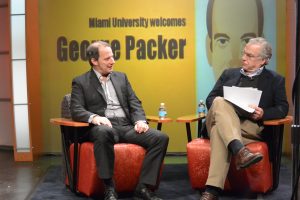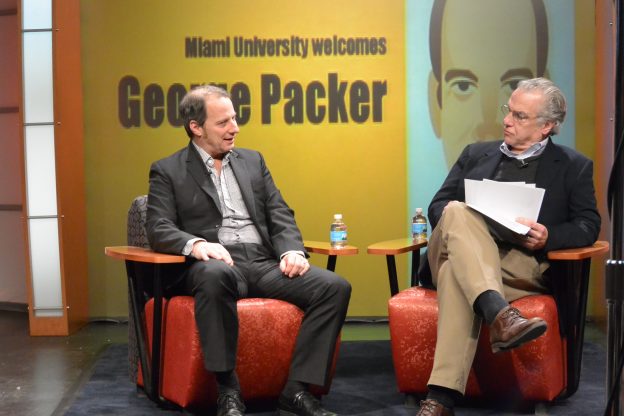The filming studio of Williams Hall is a large room. It has to be in order to hold the massive props, recording equipment, high-end professional cameras, and the filmmakers themselves. As a testament to the anticipation for this February 16th reading, the room was nearly filled to the brim with chairs set a little too close together to seat the maximum possible audience. It was a gathering of three departments: English, History, and Journalism, meeting to share experiences, advance their knowledge, and celebrate the humanities. There were three speakers: Matt Young, George Packer, and James Tobin.
Matt Young was the first to speak. He read pieces from his upcoming memoir, Eat the Apple, based on a collection of his experiences of serving in the infantry and deploying to Iraq three times. The first piece he read was “Choose Your Own Adventure,” his experiences with enlisting in the military. The title is ironic, reflecting on the lack of agency that felt during the time, “because your sense of masculinity is warped by all the men in your life, and the only way to change is through self-flagellation, achievable by war.”
Young talks about the most toxic elements of masculinity, probing deep with incredibly vivid language and pointed observations, such
as: “You wear glasses. Heroes don’t wear glasses, all men with glasses in movies are expendable, they don’t get the girl, they are villains.” Its powerful topic hit home with Young’s stage presence and excellent command of language.
Determinism and choices are something Young explores in his later pieces, as when he details his experience of harshly questioning Iraqis after an explosive detonation: “Explosive is constructed. Explosive is placed. Explosive is detonated,” and “we pursue the meerkat men, because that is what tigers do,” and “because that is what fathers do – make their sons kneel on rice, make sons feel ashamed.” He questions what it means to accept orders and give up your autonomy, becoming an instrument of the government’s orders. It’s obvious he wrestles with the weight and guilt of some of the things he is told to do, given the line he wraps up his story with: “Years later, when we’re trying to fall asleep, we tell ourselves we did what we had to do.”

After a hearty round of applause for Young, George Packer and James Tobin step up on the stage for an interview-style talk. George Packer is a war journalist that covered the Iraq war, author of The Assassins’ Gate. James Tobin is a Miami journalism professor who specializes in hard questions.
The two had good give-and-take on stage, with Tobin asking thought-provoking questions and Packer responding with fantastic observations on the nature of war and soldiers. He described the war as a “Mad fever dream—that we can take over an Arab country and make it into a beachhead of democracy and battle extremists and balance the Middle East—can you imagine the plausibility of that plan today?” He also shared several stories of Iraqi citizens that had a lot of hope in the war and American soldiers who had nothing else to give them hope. He wanted to paint the Iraq war with more shades of grey than the typical black and white light that is normally cast in the American perspective.
Packer has a great respect for the soldiers, as he described in detail. Yet he described their service as antithetical to American values. “They were submerging themselves [in their duty]…That is the least American thing to do—we’re so individualistic. They were so conscientious, no privacy, no freedom. They came from my own self-serving culture, molded to live for the mission, the greater good—military life made them peculiarly un-American.” Tobin noted the change in opinion between the Iraq war and WWII, when the very same traits would be seen as quintessentially American.
War has been a defining part of US consciousness, and it is important to recognize its human elements in order to keep them from being forgotten.
Jack Renfree
English Department Ambassador
Creative Writing; Media and Culture ‘18



